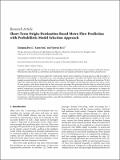Short-Term Origin-Destination Based Metro Flow Prediction with Probabilistic Model Selection Approach
Author(s)
Dai, Xiaoqing; Sun, Lijun; Xu, Yanyan
DownloadJAT.2018.5942763.pdf (2.404Mb)
PUBLISHER_CC
Publisher with Creative Commons License
Creative Commons Attribution
Terms of use
Metadata
Show full item recordAbstract
Reliable prediction of short-term passenger flow could greatly support metro authorities’ decision processes, help passengers to adjust their travel schedule, or, in extreme cases, assist emergency management. The inflow and outflow of the metro station are strongly associated with the travel demand within metro networks. The purpose of this paper is to obtain such prediction. We first collect the origin-destination information from the smart-card data and explore the passenger flow patterns in a metro system. We then propose a data driven framework for short-term metro passenger flow prediction with the ability to utilize both spatial and temporal related information. The approach adopts two forecasts as basic models and then uses a probabilistic model selection method, random forest classification, to combine the two outputs to achieve a better forecast. In the experiments, we compare the proposed model with four other prediction models, i.e., autoregressive-moving-average, neural networks, support vector regression, and averaging ensemble model, as well as the basic models. The results indicate that the proposed approach outperforms the others in most cases. The origin-destination flows extracted from smart-card data can be successfully exploited to describe different metro travel patterns. And the framework proposed here, especially the probabilistic combination method, can improve the performance of short-term transportation prediction.
Date issued
2018-06Department
Massachusetts Institute of Technology. Department of Civil and Environmental Engineering; Program in Media Arts and Sciences (Massachusetts Institute of Technology)Journal
Journal of Advanced Transportation
Publisher
Hindawi Publishing Corporation
Citation
Dai, Xiaoqing, Lijun Sun and Yanyan Xu. "Short-Term Origin-Destination Based Metro Flow Prediction with Probabilistic Model Selection Approach." Journal of Advanced Transportation, 2018.
Version: Final published version
ISSN
0197-6729
2042-3195